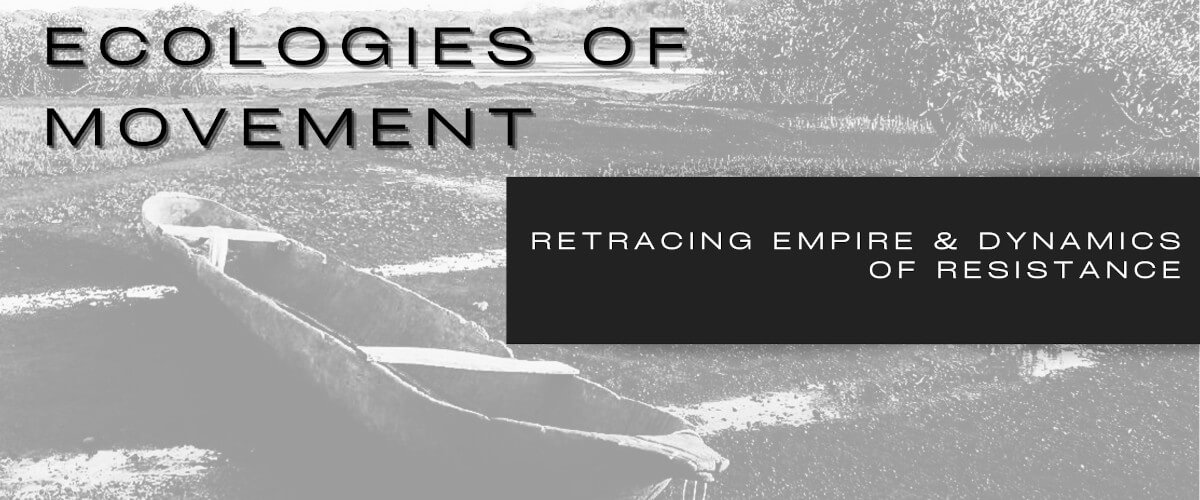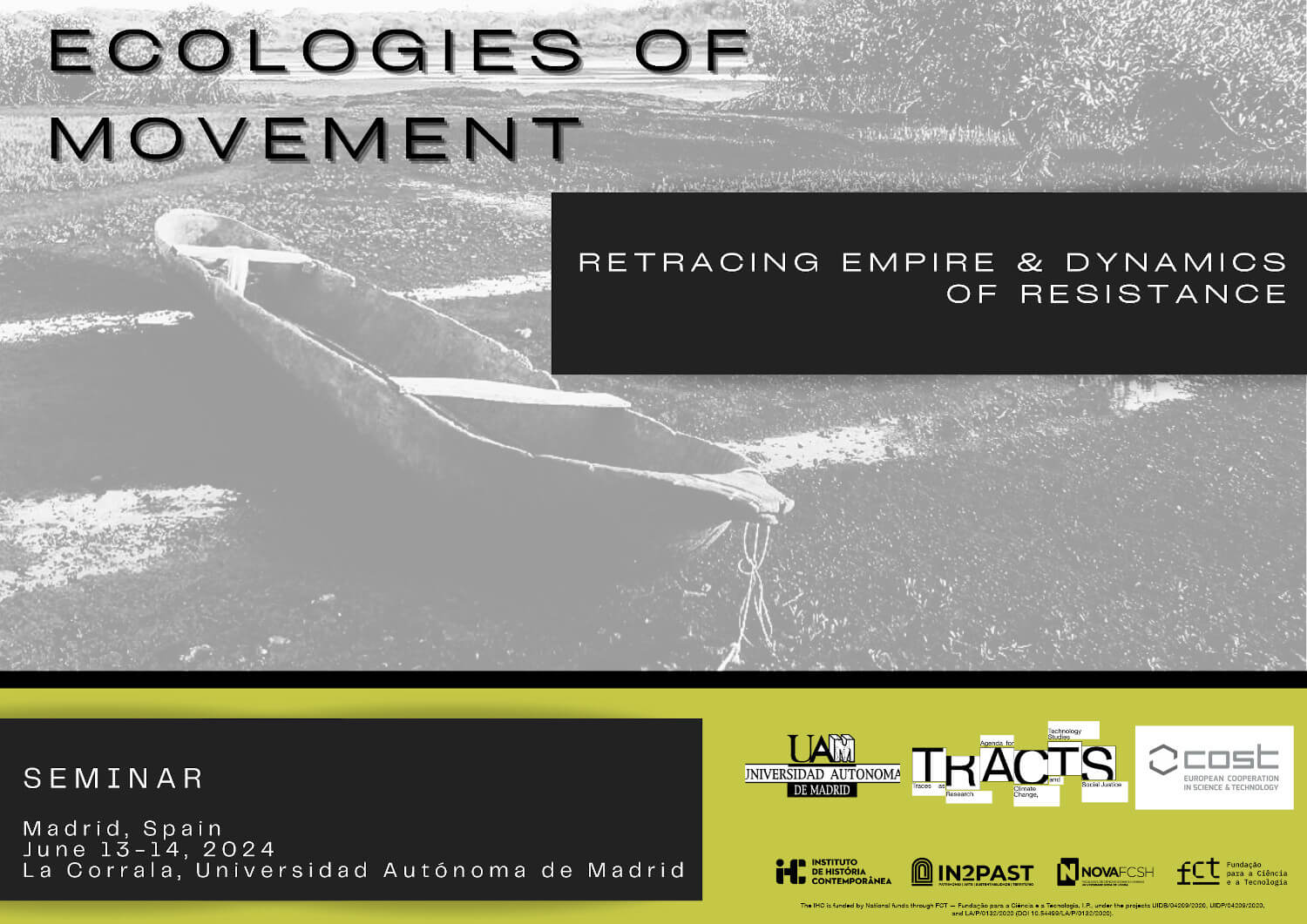junho, 2024

Detalhes do Evento
Seminário que tem como objectivo rastrear as abordagens críticas ao colonialismo, aos seus legados e às formas de resistência que desafiaram e continuam a desafiar as formas de violência e
Ver mais
Detalhes do Evento
Seminário que tem como objectivo rastrear as abordagens críticas ao colonialismo, aos seus legados e às formas de resistência que desafiaram e continuam a desafiar as formas de violência e opressão que lhe são centrais. Prazo: 15 Abril 2024
Ecologies of Movement:
Retracing Empire & Dynamics of Resistance
Colonial and imperial systems—as well as the forms of collective resistance that have challenged them—have facilitated and conditioned the circulation of people, ideas, and experiences; the movement of technologies, images, and objects; and the transnational flow of desires, affects, and always changing, fluid identities. These forms of circulation are historical but also contemporary, and their reverberations make visible material traces and epistemic realities that elucidate a wide variety of practices within and in opposition to imperial ways of life.
Drawing on the discussions and debates that are central to the TRACTS network, this seminar and workshop brings together researchers, artists, and practitioners to consider how these circulations might give way to working methodologies rooted in cross-disciplinary exchange and collective/collaborative learning. The 2-day event will focus on tracking critical approaches to colonialism, its legacies, and the forms of resistance that have and continue to challenge the forms of violence and oppression central to it. Reflecting on a series of topics, such as colonial ecology, racial capitalism, and imperial memory, as well as the forms of solidarity that emerged from emancipatory projects of resistance, the event will consider how moments of political change are privileged contexts for rethinking the circulation of persons, ideas, images, objects, cultural repertoires, and the ecologies of movement that challenge colonial epistemologies, forms of relation, and ways of being.
While this event does not commemorate the 50th anniversary of the Carnation Revolution—an event forced by actions carried out in Africa by liberation movements of Portuguese colonies that marked the end of the Estado Novo dictatorship regime and its colonial project—it does engage with these events from a critical perspective, approaching this anniversary as an opportunity to think critically about colonialism, the genealogies of contemporary racism, legacies of empire, difficult colonial pasts, and the politics of commemoration. At the same time, it uses the Portuguese case as a point of departure for expanding how we think about revolutions and counter revolutions, about political transitions and other paradigm shifts. To do this in the Spanish context, where Franco’s fascist project, as well as a much more extensive history of colonial expansion, ended not in revolution but rather in silence, provides room to consider how the history of European fascism and imperialism overlap, how resistance to both were both local and transnational, and how culture was mobilized in multiple contexts as an important tool of resistance. Finally, this event seeks to create a collective space in which to reflect upon the framework of memory and the concept of the trace as points of departure for sparking new forms of circulation and movement through which forms of solidarity, collective emancipatory projects, and their imaginaries have created and continue to create futures otherwise.
Call for Participation
PROPOSALS & ABSTRACTS I
We invite proposals that explore imperial histories, retrace different forms of circulation and movement, and highlight dynamics of resistance in and beyond the Iberian Atlantic. To participate in this seminar please present an abstract of a paper, intervention, or other audio/visual/sonic/performative/multimodal contribution to this 2-day seminar. If you are proposing an creative intervention that moves beyond the presentation of a seminar paper or talk, please indicate what this intervention will look like and what support you would need to complete it.
THEMES I
We are particularly interested in contributions that address or speak to the following topics:
- Colonialism and its manifestations of racial capitalism
- Politics of colonial repression and forms of resistance
- Legacies of colonialism and its effects on social inequalities
- Racializing colonial bodies, representing colonial figures
- Imperial exploitation and circulation: soil politics, seeds, plants, and other ways of reimagining relationships to land
- Engagements with and critical analyses of the plantationocene and its dynamics
- Colonial forced labor, imperial forced migrations, exile, and return
- Representations on colonial circulations and post-colonial migrations
- Liberation movements and transnational solidarities between Africa, Asia, Latin America and the Caribbean
- Decolonization, political actions, and the circulation of figures, anticolonial militants and repertoires of resistances between Africa, Asia, Latin America and Caribbean
- Black intellectuals, networks of resistance and transnational solidarities between Africa, Asia Latin America and Caribbean
- The Black Atlantic and the circulation of people, images, things, ideas, memories.
- Black diasporas in Europe: their agency into the ecologies of movement and forms/repertoires of resistances
- New political imaginaries, including ones that address ecological crisis and its impacts among racialized populations
- Solidarity, resistance, and the circulation of cultural objects and practices
- Radical cinema and its contributions to resisting empire and colonial structures
- Gender relations under colonialism and through imperial projects
- Print culture and visual arts: how images on empire, colonial order, gender power relations or modes of resistance mold popular imagination
- Politics of remembrance in the colonies
- Empire on display via colonial exhibitions and other curatorial and cultural initiatives in and beyond the metropole.
- Spaces, architectures, critical urbanism, monuments, and the tension between visibility and erasure
- Difficult colonial memories and contested narratives on imperial pasts
DEADLINE I
Please submit your proposals/abstracts by t All proposals/abstracts should be sent to tracts@st-andrews.ac.uk by 11pm (GMT) by the end of day on Monday, April 15th with the following subject heading: ECOLOGIES OF MOVEMENT – First Name LAST NAME – Institution. We will announce the participants before the end of April 2024.
Organisers:
Víctor Barros, IHC — NOVA FCSH / IN2PAST
José Pereira, IHC — NOVA FCSH / IN2PAST
Alberto Berzosa, Autonomous University of Madrid
Lee Douglas, Goldsmiths, University of London
>> Download the call for participants (PDF) <<
Tempo
junho 13 (Quinta-feira) - 14 (Sexta-feira)
Organizador
Instituto de História Contemporânea — Universidade NOVA de Lisboa, Universidad Autonoma de Madrid e TRACTS Network

